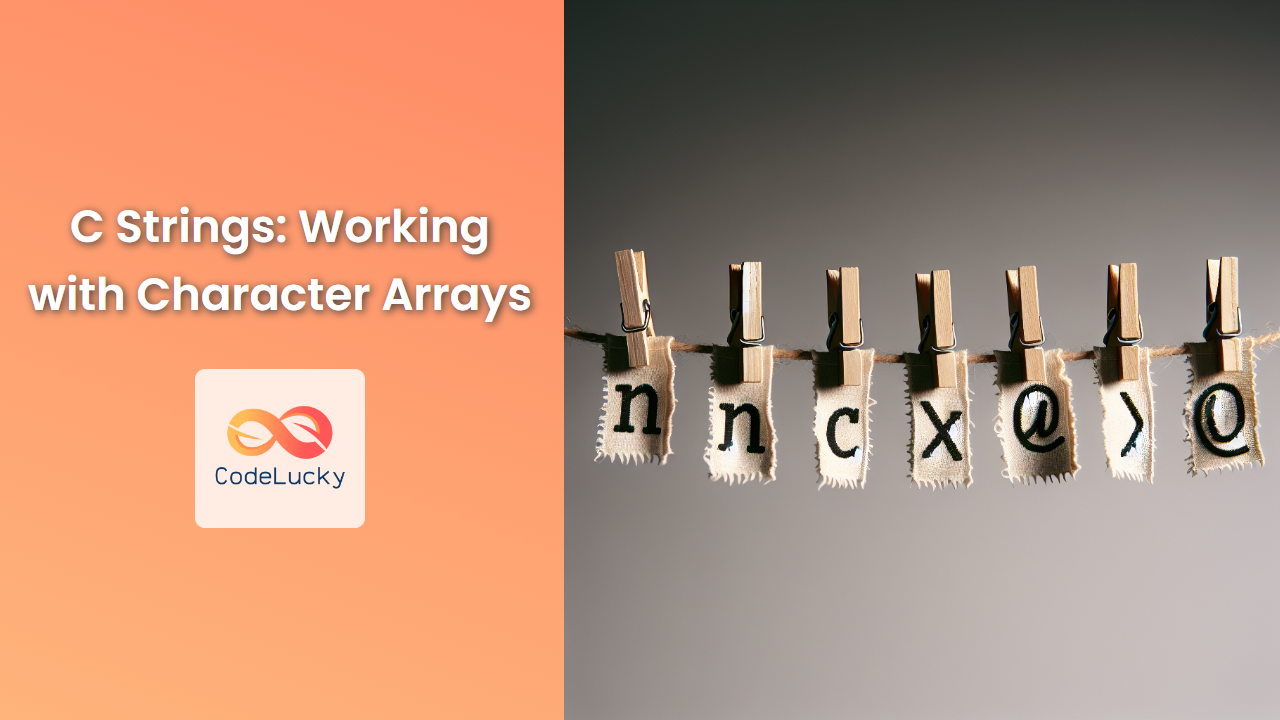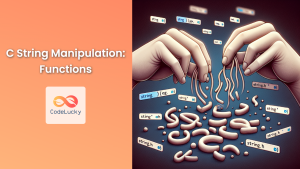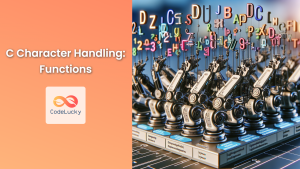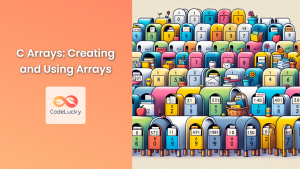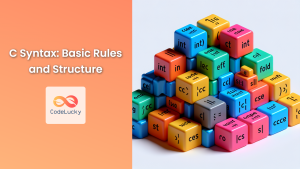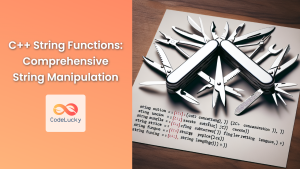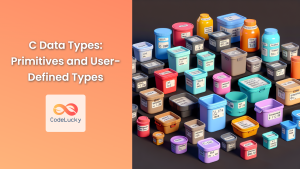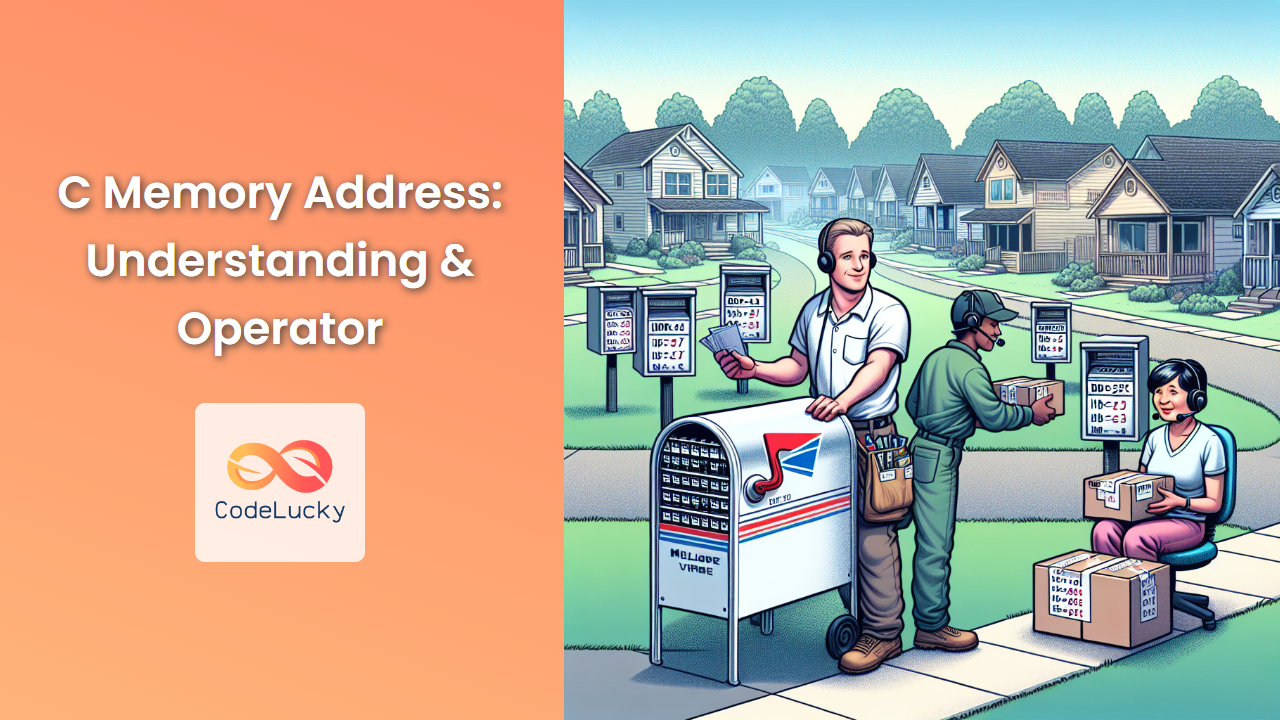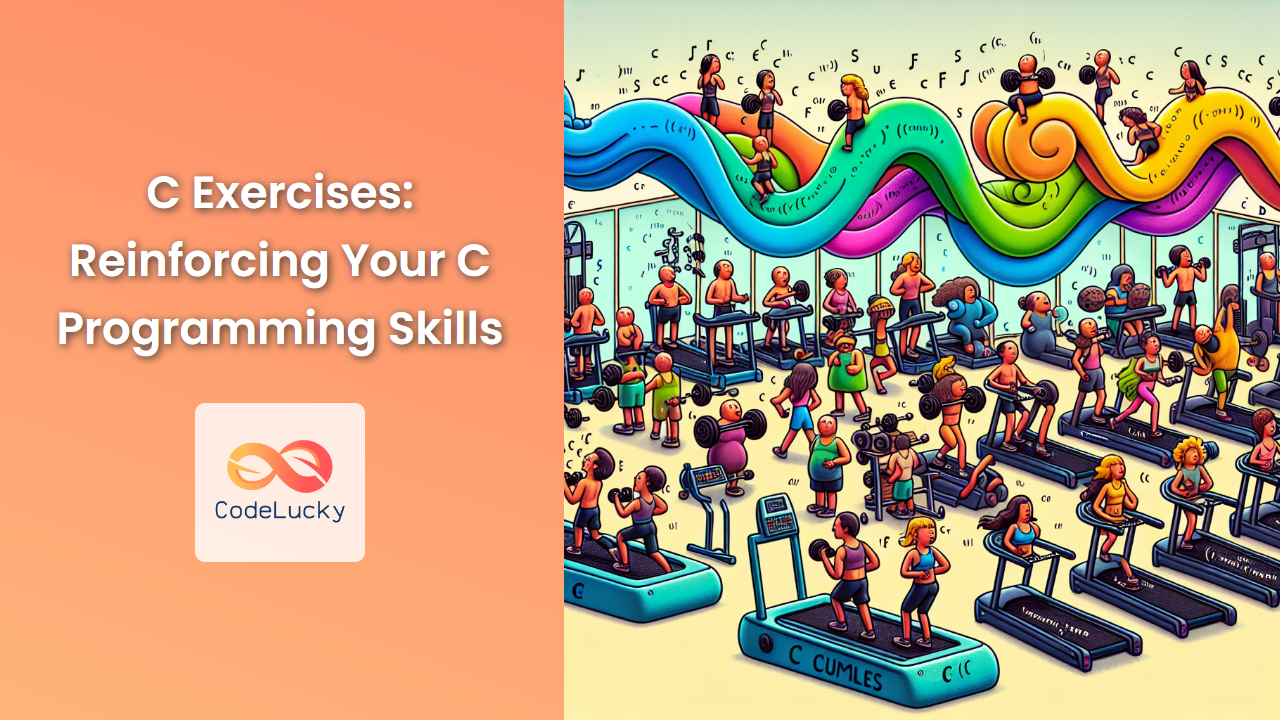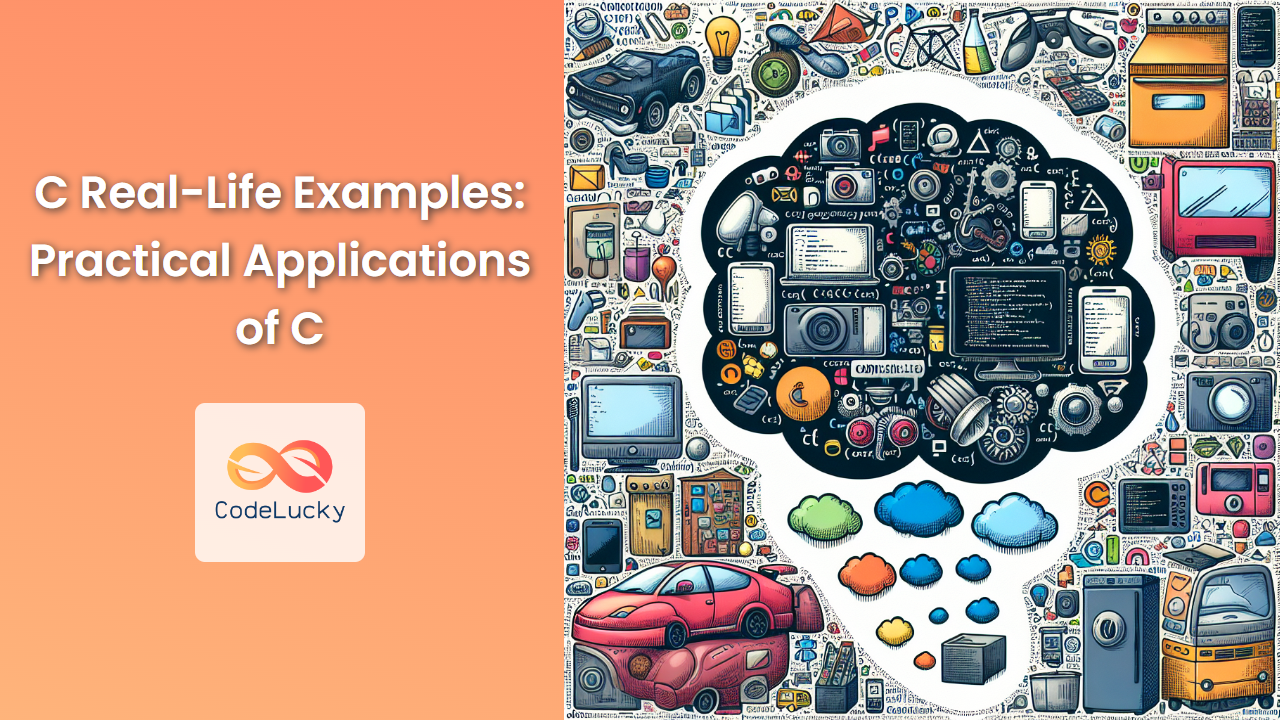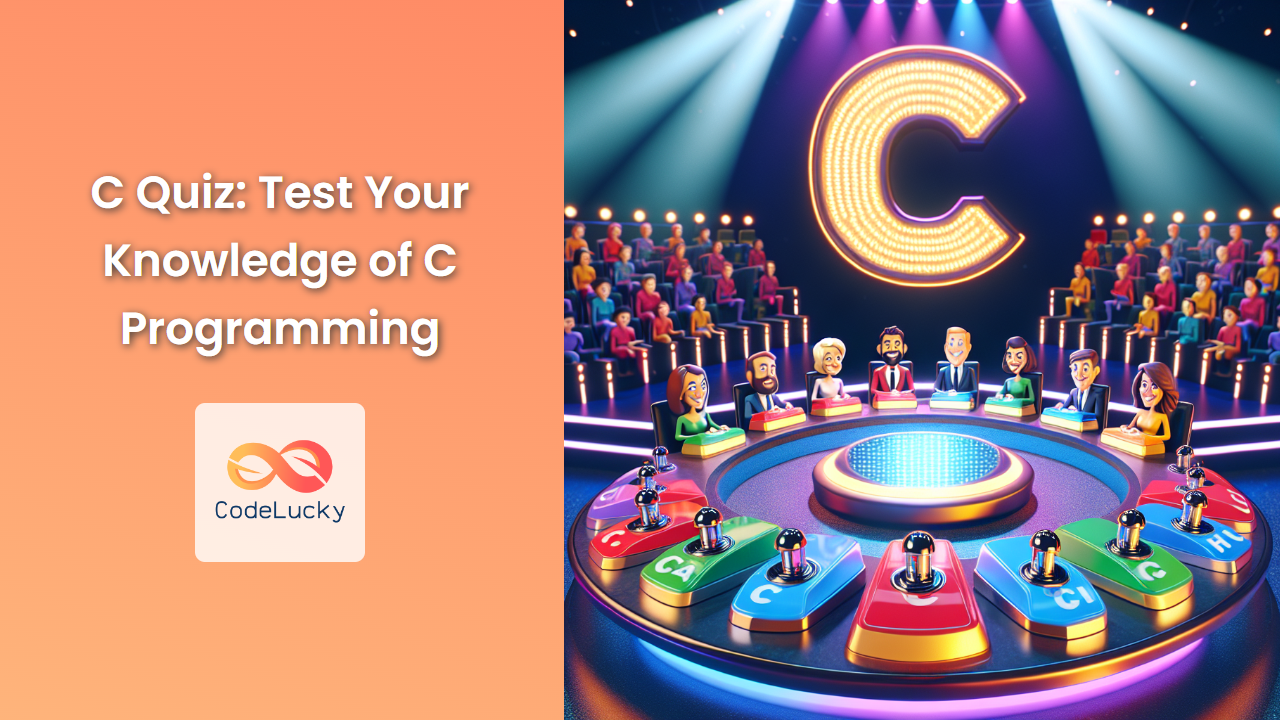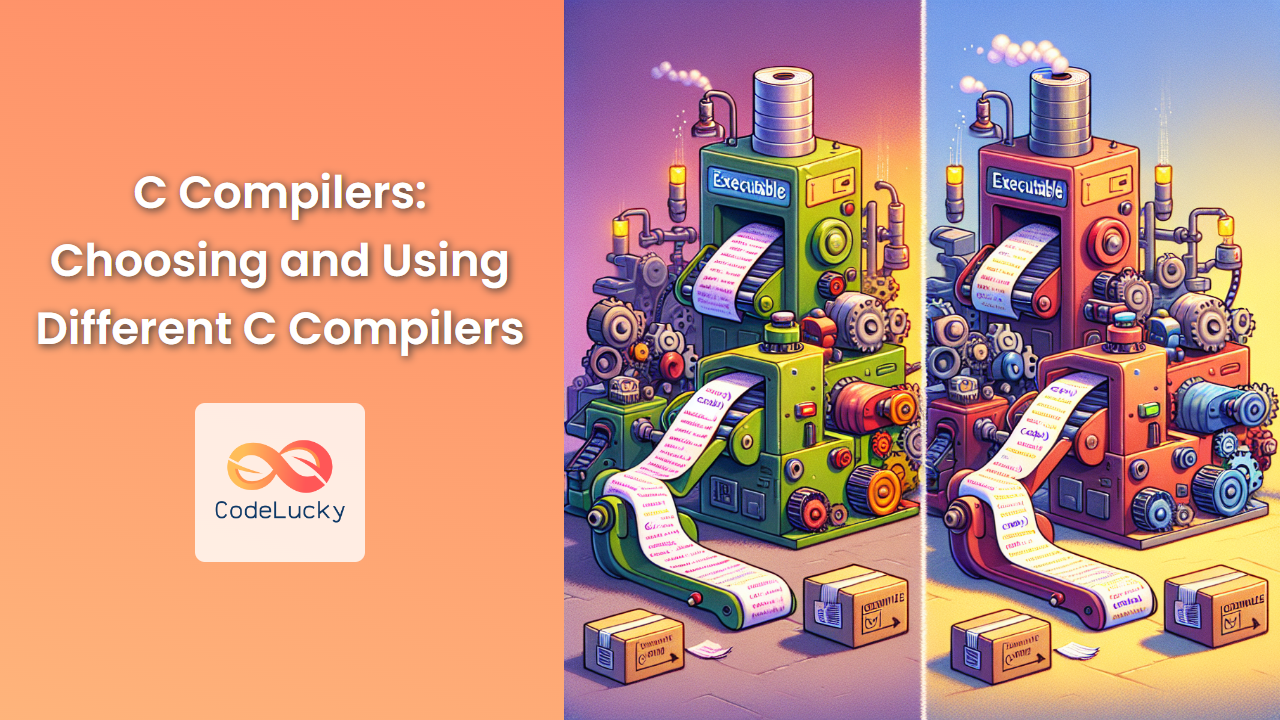In the world of C programming, strings are fundamental building blocks that allow us to work with text and character data. Unlike some higher-level languages, C doesn’t have a built-in string type. Instead, it represents strings as arrays of characters, terminated by a null character (\0). This approach gives C programmers fine-grained control over string manipulation but also requires a deeper understanding of how strings work under the hood.
Understanding C Strings
In C, a string is essentially an array of characters with a special terminating character. Let’s break this down:
- Character Array: A contiguous block of memory that holds individual characters.
- Null Terminator: The special character
\0that marks the end of the string.
Here’s a simple example to illustrate this concept:
char greeting[] = "Hello";
In memory, this string looks like this:
| Index | 0 | 1 | 2 | 3 | 4 | 5 |
|---|---|---|---|---|---|---|
| Value | H | e | l | l | o | \0 |
Notice that even though we only see five characters in “Hello”, the array actually contains six elements, with the last one being the null terminator.
🔍 Fun Fact: The null terminator is represented by the ASCII value 0, which is why it’s often written as \0 in C code.
Declaring and Initializing Strings
There are several ways to declare and initialize strings in C. Let’s explore them:
1. Array Initialization
char str1[] = "CodeLucky";
char str2[] = {'C', 'o', 'd', 'e', 'L', 'u', 'c', 'k', 'y', '\0'};
Both str1 and str2 are equivalent. The first method is more concise, and the compiler automatically adds the null terminator. In the second method, we explicitly include the null terminator.
2. Pointer Initialization
char *str3 = "CodeLucky";
This creates a pointer to a string literal. Be cautious with this method, as string literals are typically stored in read-only memory.
3. Dynamic Allocation
char *str4 = (char *)malloc(10 * sizeof(char));
strcpy(str4, "CodeLucky");
This method allocates memory dynamically and then copies the string into it. Remember to free the memory when you’re done!
String Input and Output
Let’s look at how we can read and write strings in C.
Reading Strings
We can use scanf() or fgets() to read strings from the user:
#include <stdio.h>
int main() {
char name[50];
printf("Enter your name: ");
scanf("%s", name);
printf("Hello, %s!\n", name);
return 0;
}
⚠️ Warning: scanf() with %s doesn’t handle spaces well. It stops reading at the first whitespace character.
For strings that may contain spaces, fgets() is a better choice:
#include <stdio.h>
#include <string.h>
int main() {
char fullName[100];
printf("Enter your full name: ");
fgets(fullName, sizeof(fullName), stdin);
// Remove the newline character if present
fullName[strcspn(fullName, "\n")] = 0;
printf("Nice to meet you, %s!\n", fullName);
return 0;
}
Writing Strings
To output strings, we can use printf() or puts():
#include <stdio.h>
int main() {
char message[] = "C programming is powerful!";
printf("%s\n", message);
puts(message); // puts automatically adds a newline
return 0;
}
String Manipulation
C provides several functions in the <string.h> library for string manipulation. Let’s explore some common operations:
1. String Length
The strlen() function returns the length of a string (excluding the null terminator):
#include <stdio.h>
#include <string.h>
int main() {
char text[] = "CodeLucky";
int length = strlen(text);
printf("The length of '%s' is %d\n", text, length);
return 0;
}
Output:
The length of 'CodeLucky' is 9
2. String Concatenation
The strcat() function appends one string to another:
#include <stdio.h>
#include <string.h>
int main() {
char str1[20] = "Code";
char str2[] = "Lucky";
strcat(str1, str2);
printf("Concatenated string: %s\n", str1);
return 0;
}
Output:
Concatenated string: CodeLucky
⚠️ Caution: Ensure the destination string (str1 in this case) has enough space to accommodate the concatenated result.
3. String Copying
The strcpy() function copies one string to another:
#include <stdio.h>
#include <string.h>
int main() {
char source[] = "Hello, World!";
char destination[20];
strcpy(destination, source);
printf("Copied string: %s\n", destination);
return 0;
}
Output:
Copied string: Hello, World!
4. String Comparison
The strcmp() function compares two strings:
#include <stdio.h>
#include <string.h>
int main() {
char str1[] = "apple";
char str2[] = "banana";
int result = strcmp(str1, str2);
if (result < 0) {
printf("%s comes before %s\n", str1, str2);
} else if (result > 0) {
printf("%s comes after %s\n", str1, str2);
} else {
printf("%s is equal to %s\n", str1, str2);
}
return 0;
}
Output:
apple comes before banana
🔍 Note: strcmp() returns a negative value if the first string is lexicographically smaller, a positive value if it’s larger, and zero if the strings are equal.
Advanced String Operations
Let’s dive into some more advanced string operations that C programmers often encounter.
1. Tokenizing Strings
The strtok() function allows you to split a string into tokens based on a delimiter:
#include <stdio.h>
#include <string.h>
int main() {
char sentence[] = "C programming is fun and powerful";
char *token;
// Get the first token
token = strtok(sentence, " ");
// Walk through other tokens
while (token != NULL) {
printf("%s\n", token);
token = strtok(NULL, " ");
}
return 0;
}
Output:
C
programming
is
fun
and
powerful
⚠️ Warning: strtok() modifies the original string by replacing delimiters with null terminators.
2. Finding Substrings
The strstr() function finds the first occurrence of a substring within a string:
#include <stdio.h>
#include <string.h>
int main() {
char haystack[] = "CodeLucky is a great resource for learning C";
char needle[] = "great";
char *result = strstr(haystack, needle);
if (result) {
printf("Substring '%s' found at position: %ld\n", needle, result - haystack);
} else {
printf("Substring not found\n");
}
return 0;
}
Output:
Substring 'great' found at position: 19
3. Converting Strings to Numbers
C provides functions like atoi(), atof(), and strtol() for converting strings to numbers:
#include <stdio.h>
#include <stdlib.h>
int main() {
char str_int[] = "42";
char str_float[] = "3.14159";
char str_long[] = "1234567890";
int num_int = atoi(str_int);
float num_float = atof(str_float);
long num_long = strtol(str_long, NULL, 10);
printf("Integer: %d\n", num_int);
printf("Float: %f\n", num_float);
printf("Long: %ld\n", num_long);
return 0;
}
Output:
Integer: 42
Float: 3.141590
Long: 1234567890
String Formatting
C’s sprintf() function allows you to format strings similar to printf(), but instead of printing to the console, it writes to a string:
#include <stdio.h>
int main() {
char buffer[100];
int age = 30;
float height = 1.75;
sprintf(buffer, "I am %d years old and %.2f meters tall.", age, height);
printf("%s\n", buffer);
return 0;
}
Output:
I am 30 years old and 1.75 meters tall.
Memory Management with Strings
When working with strings, especially dynamically allocated ones, proper memory management is crucial to avoid leaks and undefined behavior.
Dynamic String Allocation
Here’s an example of dynamically allocating a string and then freeing it:
#include <stdio.h>
#include <stdlib.h>
#include <string.h>
int main() {
char *dynamic_str = (char *)malloc(20 * sizeof(char));
if (dynamic_str == NULL) {
fprintf(stderr, "Memory allocation failed\n");
return 1;
}
strcpy(dynamic_str, "Dynamic String");
printf("%s\n", dynamic_str);
free(dynamic_str); // Don't forget to free!
return 0;
}
🔍 Pro Tip: Always check if malloc() succeeded before using the allocated memory.
Resizing Strings
Sometimes, you might need to resize a string. The realloc() function can help:
#include <stdio.h>
#include <stdlib.h>
#include <string.h>
int main() {
char *str = (char *)malloc(10 * sizeof(char));
strcpy(str, "Hello");
printf("Original string: %s\n", str);
// Resize to accommodate a longer string
str = (char *)realloc(str, 20 * sizeof(char));
strcat(str, " World!");
printf("Resized string: %s\n", str);
free(str);
return 0;
}
Output:
Original string: Hello
Resized string: Hello World!
Common Pitfalls and Best Practices
When working with C strings, there are several common pitfalls to avoid:
-
Buffer Overflow: Always ensure your destination buffer is large enough when copying or concatenating strings.
-
Forgetting the Null Terminator: When manually creating strings, don’t forget to include the null terminator.
-
Using Uninitialized Strings: Always initialize your strings before using them.
-
String Literal Modification: Don’t try to modify string literals, as they are often stored in read-only memory.
Here’s an example demonstrating these pitfalls and how to avoid them:
#include <stdio.h>
#include <string.h>
#define MAX_LENGTH 50
int main() {
// Good: Properly sized buffer
char safe_str[MAX_LENGTH];
strncpy(safe_str, "This is a safe string", MAX_LENGTH - 1);
safe_str[MAX_LENGTH - 1] = '\0'; // Ensure null-termination
// Bad: Potential buffer overflow
char unsafe_str[10];
strcpy(unsafe_str, "This string is too long for the buffer");
// Good: Properly initialized string
char initialized_str[MAX_LENGTH] = {0}; // All elements set to 0
// Bad: Trying to modify a string literal
char *literal = "Don't modify me";
// literal[0] = 'd'; // This would cause undefined behavior
printf("Safe string: %s\n", safe_str);
return 0;
}
🛡️ Best Practices:
- Use
strncpy()instead ofstrcpy()to limit the number of characters copied. - Always null-terminate your strings explicitly when using
strncpy(). - Initialize your strings, especially when declaring character arrays.
- Use string literals for constants, and character arrays for mutable strings.
Conclusion
C strings, represented as character arrays, offer powerful text manipulation capabilities but require careful handling. By understanding the underlying structure of C strings and mastering functions from the <string.h> library, you can effectively work with text data in your C programs.
Remember to always be mindful of buffer sizes, null terminators, and proper memory management when working with strings. With practice, you’ll find that C’s approach to strings, while requiring more attention to detail, provides great flexibility and performance in text processing tasks.
Happy coding with C strings! 🚀📝

